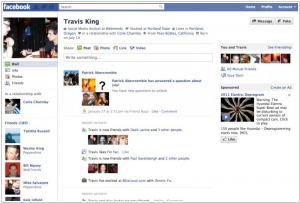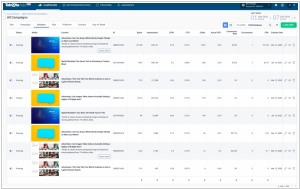Facebook Ads vs Taboola
November 03, 2023 | Author: Sandeep Sharma
Facebook Ads and Taboola are both popular advertising platforms, but they have distinct differences in terms of their offerings and targeting capabilities.
Facebook Ads is a comprehensive advertising platform provided by Facebook. It allows businesses to create and manage ad campaigns that target specific demographics, interests, and behaviors of Facebook users. With a vast user base and detailed user data, Facebook Ads offers precise targeting options and various ad formats, including image ads, video ads, and carousel ads. It provides robust analytics and tracking features to measure campaign performance and optimize ad delivery.
Taboola, on the other hand, is a native advertising platform that focuses on content discovery and recommendations. It enables businesses to promote their content through sponsored articles, videos, and other native ad formats across a network of publishers. Taboola's strength lies in its ability to distribute content on high-traffic websites and reach a broader audience. It uses algorithms to match content with user preferences, increasing the chances of engagement and conversions.
See also: Top 10 Online advertising services
Facebook Ads is a comprehensive advertising platform provided by Facebook. It allows businesses to create and manage ad campaigns that target specific demographics, interests, and behaviors of Facebook users. With a vast user base and detailed user data, Facebook Ads offers precise targeting options and various ad formats, including image ads, video ads, and carousel ads. It provides robust analytics and tracking features to measure campaign performance and optimize ad delivery.
Taboola, on the other hand, is a native advertising platform that focuses on content discovery and recommendations. It enables businesses to promote their content through sponsored articles, videos, and other native ad formats across a network of publishers. Taboola's strength lies in its ability to distribute content on high-traffic websites and reach a broader audience. It uses algorithms to match content with user preferences, increasing the chances of engagement and conversions.
See also: Top 10 Online advertising services
Facebook Ads vs Taboola in our news:
2023. Meta debuts generative AI features for advertisers
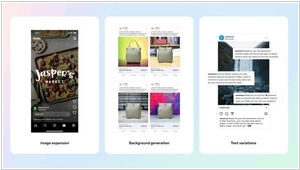
Meta is introducing its initial generative AI capabilities designed for advertisers. These features empower advertisers to employ AI for tasks such as crafting backgrounds, enlarging images, and generating multiple versions of ad text derived from their original content. These new offerings exemplify Meta's belief in the potential of generative AI to aid the brands and enterprises that contribute significantly to Meta's revenue stream. The first feature in this trio enables advertisers to personalize their creative assets by producing diverse backgrounds, transforming the appearance of their product images. This functionality is akin to Meta's consumer-oriented tool, Backdrop, which permits users to modify their image's setting or background through prompts. Another feature, image expansion, enables advertisers to adapt their assets to various aspect ratios needed for different products, such as Feed or Reels. Moreover, within Meta Ads Manager, the text variations feature utilizes AI to generate up to six distinct text versions based on the advertiser's original content.
2016. Facebook tests ads in Groups
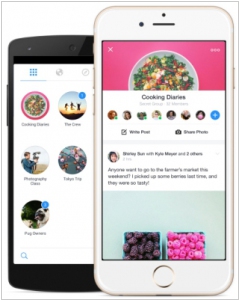
Facebook is set to introduce advertisements to its Groups feature, reaching its 1 billion user base. These ads will adopt the same appearance as News Feed ads and will be targeted based on both Group topics and standard identity-based targeting. The diverse range of purposes that Groups serve can significantly enhance the value of these ads. By effectively categorizing Groups and refining ad targeting, Facebook can deliver highly relevant and profitable ads to individuals with varied interests. For instance, if someone has indicated their affinity for the Manchester United football team by liking their Page, it suggests a likelihood of their interest in purchasing sports merchandise. This capability to target specific interest groups opens up opportunities for advertisers to reach their intended audience with precision and increase the effectiveness of their campaigns.
2015. Facebook partners with IBM to make ads targeting easier for big brands

Facebook and IBM have jointly announced a collaboration that brings together their advertising tools and experts to assist large companies in tailoring their marketing strategies for customers. This partnership aims to enhance the relevance of ads presented to individuals. For instance, advertisers can leverage IBM's data to identify specific customer segments for targeted marketing campaigns through email and Facebook. Alternatively, a sports brand could collaborate with IBM and Facebook to deliver real-time Facebook ads to customers attending a game, leveraging IBM's location data. This collaboration enables both Facebook and IBM to strengthen their relationships with major advertisers. Additionally, it serves as an incentive for IBM's Fortune 500 clients to engage more closely with Facebook, which seeks to expand its advertising revenue. Simultaneously, IBM gains access to the vast amount of consumer data collected by Facebook, offering valuable insights for their marketing endeavors.
2015. Facebook launched automated Product Ads
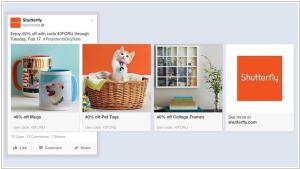
Facebook has introduced a new option called Product Ads, which comprises a suite of tools designed to enhance businesses' targeting capabilities on its platform, reaching its vast user base of approximately 1.4 billion individuals through an automated process. With Product Ads, businesses can upload their product catalogs to Facebook and either manually create ad campaigns or allow Facebook to automatically generate campaigns that target specific user segments. Facebook's automated approach leverages factors such as user interests, general location, and previous interactions with the advertiser's app or website to optimize ad performance. This feature is particularly advantageous for businesses with extensive inventories of appealing products, such as furniture chains or clothing franchises, as it increases the likelihood of users discovering and purchasing items.
2014. Facebook launches hyper-local ads
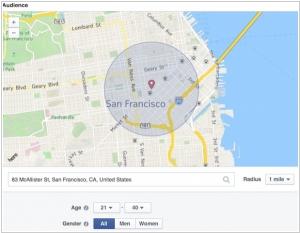
Facebook Ads has introduced a new hyper-local targeting feature aimed at enticing people to visit nearby stores and businesses. This update enables brick-and-mortar establishments to specifically target their ads towards individuals who either reside in or have recently been in close proximity to their stores. Advertisers have the flexibility to set a radius as small as a mile, and the ads will be displayed on users' mobile phones or web browsers. These Local Awareness ads will initially be available to business owners in the United States within the next few weeks, followed by a global rollout over the next several months. With over 1 billion mobile users on Facebook, a significant number of whom provide location access, along with desktop users who willingly share their current city or can be identified through IP addresses, the platform possesses extensive reach. Moreover, the recent introduction of the ambient proximity feature called Nearby Friends allows Facebook to access real-time location data from some users in the United States.
2014. Facebook takes on Google AdWords with Atlas
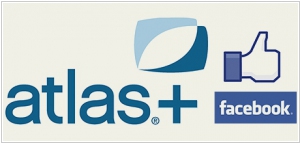
Facebook has recently launched a new advertising platform called Atlas that aims to target users on any website by utilizing their Facebook information. Atlas was acquired by Facebook from Microsoft last year. The platform is designed to rival Google's AdWords, enabling advertisers to display ads that track users across the web and mobile devices. Advertisers have the option to purchase ads on external websites and apps, with the choice of incorporating the Facebook social network. Instead of relying on cookies, Facebook will utilize the user's Facebook login details. While this move may not be well-received by Facebook users, it provides an alternative for advertisers and serves as competition to Google AdWords.
2014. Facebook unveils Business Manager for marketers
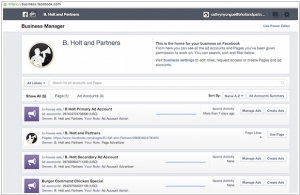
Facebook Business Manager is an innovative tool designed to empower marketers and agencies in effectively managing multiple campaigns through a unified interface. With this tool, you have the ability to grant access and assign roles to individuals involved in various campaigns, ensuring secure sharing of campaign materials. Moreover, Business Manager allows marketers to effortlessly add or remove ad accounts associated with a company and control permissions granted to individuals using those accounts. Additionally, the tool offers streamlined workflows that facilitate the separation of personal and business experiences on Facebook. Users can conveniently utilize their Facebook Login credentials to access ad accounts and Pages without the requirement of being friends with others for access privileges.

